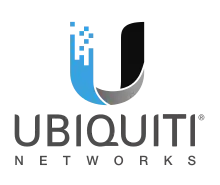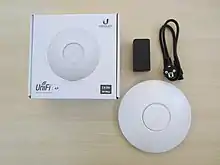Ubiquiti
Ubiquiti Inc. (formerly Ubiquiti Networks, Inc.) is an American technology company founded in San Jose, California, in 2005. Now based in New York City,[2] Ubiquiti manufactures and sells wireless data communication and wired products for enterprises and homes under multiple brand names.
 | |
| Type | Public |
|---|---|
| NYSE: UI Russell 1000 Index component | |
| Industry | Computer networking, energy |
| Founded | June 2005 |
| Founders | Robert Pera |
| Headquarters | , United States |
| Products | Computer networking devices |
| Revenue | |
| Total assets | |
| Total equity | |
Number of employees | 843 (as of June 30, 2018)[1] |
| Website | www |
Products
Ubiquiti's first product line was its "Super Range" mini-PCI radio card series, which was followed by other wireless products.
The company's Xtreme Range (XR) cards operated on non-standard IEEE 802.11 bands, which reduced the impact of congestion in the 2.4 GHz and 5.8 GHz bands. In August 2007 a group of Italian amateur radio operators set a distance world record for point-to-point links in the 5.8 GHz spectrum. Using two XR5 cards and a pair of 35 dBi dish antennas, the Italian team was able to establish a 304 km (about 188 mi) link at data rates between 4 and 5 Mbit/s.[3]
The company (under its "Ubiquiti Labs" brand) also manufactures a home-oriented wireless mesh network router and access point combination as a consumer-level product, called AmpliFi.[4]
Brands

Ubiquiti product lines include UniFi, EdgeMax, UISP, AirMax, AirFiber, GigaBeam and UFiber. The most common product line is UniFi which is focused on home and business wired and wireless networking. EdgeMax is a product line dedicated to wired networking, containing only routers and switches. UISP, announced in 2020, is a range of products for internet service providers.[5]
AirMax is a product line dedicated to creating point-to-point (PTP) and point-to-multi-point (PtMP) links between networks. AirFiber and UFiber are used by Wireless Internet Service Providers (WISP), and Internet Service Providers (ISP) respectively.
Software products
UniFi controller is a software package which can either run on special hardware (UniFi Cloudkeys, UniFi Dream Machine) or can be installed on Linux servers. The controller manages all connected devices (access points, routers, switches, cameras, locks) and provides a single point for configuration and administration.
WiFiman.com is an internet speed test tool which is integrated into most Ubiquiti products. It has mobile apps and a web version.
Security issues
U-Boot configuration extraction
In 2013, it was discovered that there was a security issue in the version of the U-Boot boot loader shipped on Ubiquiti's devices. It was possible to extract the plaintext configuration from the device without leaving a trace using Trivial File Transfer Protocol (TFTP) and an Ethernet cable, revealing information such as passwords.[6]
While this issue is fixed in current versions of Ubiquiti hardware, despite many requests and acknowledging that they are using this GPL-protected application, Ubiquiti refused to provide the source code for the GNU General Public License (GPL)-licensed U-Boot.[7][8] This made it impractical for Ubiquiti's customers to fix the issue.[7] The GPL-licensed code was released eventually.[9]
Uparte Trojan
It was reported by online reporter Brian Krebs, on June 15, 2015, that "Recently, researchers at the Fujitsu Security Operations Center in Warrington, UK began tracking [the] Upatre [trojan software] being served from hundreds of compromised home routers – particularly routers powered by MikroTik and Ubiquiti's AirOS". Bryan Campbell of the Fujitsu Security Operations Center in Warrington, UK was reported as saying: "We have seen literally hundreds of wireless access points, and routers connected in relation to this botnet, usually AirOS ... The consistency in which the botnet is communicating with compromised routers in relation to both distribution and communication leads us to believe known vulnerabilities are being exploited in the firmware which allows this to occur".[10]
2021 cloud data breach
In January 2021, a potential data breach of cloud accounts was reported,[11] with customer credentials having potentially been exposed to an unauthorised third party.
IPO
On October 13, 2011, Ubiquiti had its initial public offering (IPO) at 7.04 million shares, at $15 per share.,[12] raising $30.5 million.[13]
Legal difficulties
United States sanctions against Iran
In March 2014, Ubiquiti agreed to pay $504,225 to the Office of Foreign Assets Control after it allegedly violated U.S. sanctions against Iran.[14]
Open-source licensing compliance
In 2015, Ubiquiti was accused of violating the terms of the GPL license for open-source code used in their products.[8] The original source of the complaint updated their website on May 24, 2017, when the issue was resolved.[9] In 2019, Ubiquiti was reported to continually violate GPL.[15]
Other
In 2015, Ubiquiti revealed that it lost $46.7 million when its finance department was tricked into sending money to someone posing as an employee.[16]
References
- "Ubiquiti Networks 2018 SEC Form 10-K".
- Witkowski, Wallace (September 18, 2017). "Ubiquiti shares hammered by Citron 'fraud' claim that contains little new evidence - MarketWatch". MarketWatch.com. Retrieved November 29, 2017.
That may be a factor that led Ubiquiti’s auditor, PWC, to cite a lack of internal controls in 2015, and an eventual staff clear-out that led Ubiquiti to move its headquarters from San Jose, Calif., to New York City and change auditors to KPMG.
- "World Record 304km Wi-Fi connection". Gizmag.com. Retrieved December 22, 2012.
- "Hands-on: Ubiquiti's Amplifi covers the whole house in a Wi-Fi mesh". Ars Technica. July 20, 2016. Retrieved December 1, 2016.
- "Ubiquiti: UISP Is The New UNMS". McCann Tech. December 29, 2020. Retrieved January 24, 2021.
- "Re: AirOS and Security: DUMP of configuration files with TFTP or other thing". Ubnt.com. July 16, 2014. Retrieved May 9, 2017.
- "GPL archive missing components". Ubnt.com. March 2, 2013. Archived from the original on December 9, 2016. Retrieved May 9, 2017.
- Riley Baird (April 7, 2015). "How Ubiquiti Networks Is Creatively Violating the GPL". LibertyBSD. Archived from the original on April 30, 2017. Retrieved April 30, 2017.
- Riley Baird (May 24, 2017). "N/A". LibertyBSD. Archived from the original on May 24, 2017. Retrieved December 12, 2017.
- "Crooks Use Hacked Routers to Aid Cyberheists". Krebs on Security. June 29, 2015.
- "Ubiquiti says customer data may have been accessed in data breach". TechCrunch. Retrieved January 19, 2021.
- "Ubiquiti Networks IPO Priced To Work At $15?". Seeking Alpha. Retrieved December 22, 2012.
- "Annual report for fiscal year ended June 30, 2012". Form 10-K. US Securities and Exchange Commission. September 21, 2012. Retrieved October 16, 2013.
- "Ubiquiti Networks settles with OFAC for alleged violations of Iran sanctions", Debevoise & Plimpton LLP, March 7, 2014.
- Denver Gingerich (October 2, 2019). "When companies use the GPL against each other, our community loses". SFconservancy. Retrieved December 21, 2020.
- "Fraudsters duped this company into handing over $40 million". Fortune.com. August 10, 2015. Retrieved October 19, 2015.